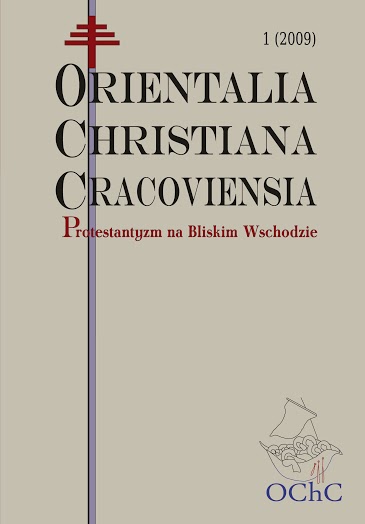Odpowiadając islamowi – protestanci w dialogu i polemice z muzułmanami
DOI:
https://doi.org/10.15633/ochc.1001Słowa kluczowe:
Islam, chrześcijaństwo, protestantyzm, dialog, polemikaAbstrakt
The main issues on which a Christian-Muslim polemic focuses are: the status of the Bible and the figure of Jesus. The main sources to be used by Protestants in their polemic with Muslim clearly are the Bible and the Koran. Book and electronic publications require examination of several subjects: 1) The authenticity of the Bible (i.e. the Torah and Gospel), 2) The divinity of Jesus- the Savior, 3) Islam and Christianity, 4) The status of the Koran, 5) The so-called “false testimony”, e.g. Gospel of Barnabas, the issue of Paraclete. It should be remembered that in most cases a rather radical attitude of some Protestant studies is connected with the impossibility of having a real dialogue between the two religions based on the mutual exegesis of letters and dogmas and the text hermeneutics – the Bible is analyzed by Muslim theologians with regards to its contents to the Koran, and the Koran may not be subject to the classic text criticism applied by bibliologists with reference to the Hebrew Bible or to the New Testament books. Presenting someone with the Koran constitutes a call to accept Islam, whereas presenting someone with the Bible is regarded as an act of Christian missionary activity, naturally rejected by Muslims. Religious pluralism, which constitutes a base for a dialogue between religions, is unknown to numerous Muslim clergymen. As Bassam Tibi put it, “both parties of the dialogue have to acquire unprejudiced theological and historical knowledge”.
Bibliografia
Bucaille M., Bible, Qur’an and Science, Qum 1996.
Campbell W., The Qur’an and the Bible in the Light of History and Science, Upper Darby 1992.
Cotterell F. P., The Gospel of Barnabas, „Vox Evangelica” 10 (1977), s. 45–46.
Gnilka J., Biblia a Koran. Podobieństwa i różnice, tłum. W. Szymona, Kraków 2005.
Jadeed I., Sin and Atonement in Islam and Christianity, Rikon [1980–1985?].
Leirvik O., History as a Literary Weapon. The Gospel of Barnabas in Muslim-Christian Polemics, „Studia Theologica” 2002 nr 1, s. 4–26, http://dx.doi.org/10.1080/003933802760115417.
Al-Masih Abd, Who is Allah in Islam?, Villach [1982?].
Al-Masih Abd, Islam Under the Magnifying Glass, Villach [1990?].
Al-Masih Abd, Holy War in Islam, Villach [1991].
Thomas R. W., Islam. Aspects and Prospects. A Critical Analysis, Villach [1992].
Tibi B. Selig sind die Betrogenen. Christlich-islamisches Dialog – Täuschungen und westliches Wunschdenken, von Bassam, [w:] Feindbild Christentum im Islam. Eine Bestandsaufnahme, hrsg. U. Spuler-Stegemann, Bonn 2006, s. 54–61 (Bundeszentrale für Politische Bildung. Schriftenreihe, 573).
Tisdall W. S. Clair, Christian Reply to Muslim Objections [wcześniej: A Manual of the Leading Mohammadanian Objections to Christianity, London 1904], Villach 1980.
Turek W. P., Aḥmad – Paraklet – Mani. Spojrzenie na kontrowersyjny werset 61, 6 Koranu, [w:] Spotkania Arabistyczne, t. 3, Kraków 2000, s. 19–26.
Pobrania
Opublikowane
Numer
Dział
Licencja
Twórca oświadcza, że przysługują mu prawa autorskie do utworu i że nie są ograniczone w zakresie objętym niniejszym oświadczeniem oraz że utwór jest dziełem oryginalnym i nie narusza praw autorskich innych osób.
Twórca zezwala Uniwersytetowi Papieskiemu Jana Pawła II w Krakowie na nieodpłatne, niewyłączne i nieograniczone w czasie korzystanie z utworu, to jest:
- utrwalanie i zwielokrotnianie: wytwarzanie egzemplarzy utworu techniką drukarską, reprograficzną, zapisu magnetycznego oraz techniką cyfrową;
- obrotu oryginałem albo egzemplarzami, na których utwór utrwalono (wprowadzanie do obrotu, użyczenie lub najem oryginału albo egzemplarzy, publiczne wystawienie, wyświetlenie, a także publiczne udostępnianie utworu w taki sposób, aby każdy mógł mieć do niego dostęp w miejscu i w czasie przez siebie wybranym);
- włączenie utworu w skład utworu zbiorowego;
- udzielanie przez Uniwersytet Papieski Jana Pawła II w Krakowie sublicencji Creative Commons Uznanie autorstwa-Użycie niekomercyjne-Bez utworów zależnych 3.0 Polska
Uniwersytet Papieski Jana Pawła II w Krakowie udostępnia utwór na Platformie Czasopism należącej do uczelni, na licencji Creative Commons Uznanie autorstwa-Użycie niekomercyjne-Bez utworów zależnych 3.0 Polska. Tym samym uprawnia wszystkich zainteresowanych do korzystania z utworu pod następującymi warunkami:
- zostanie podany autor i tytuł utworu,
- zostanie podane miejsce publikacji (tytuł czasopisma i adres internetowy do oryginalnie opublikowanego utworu),
- utwór będzie dystrybuowany w sposób niekomercyjny,
- nie będą tworzone utwory zależne.

